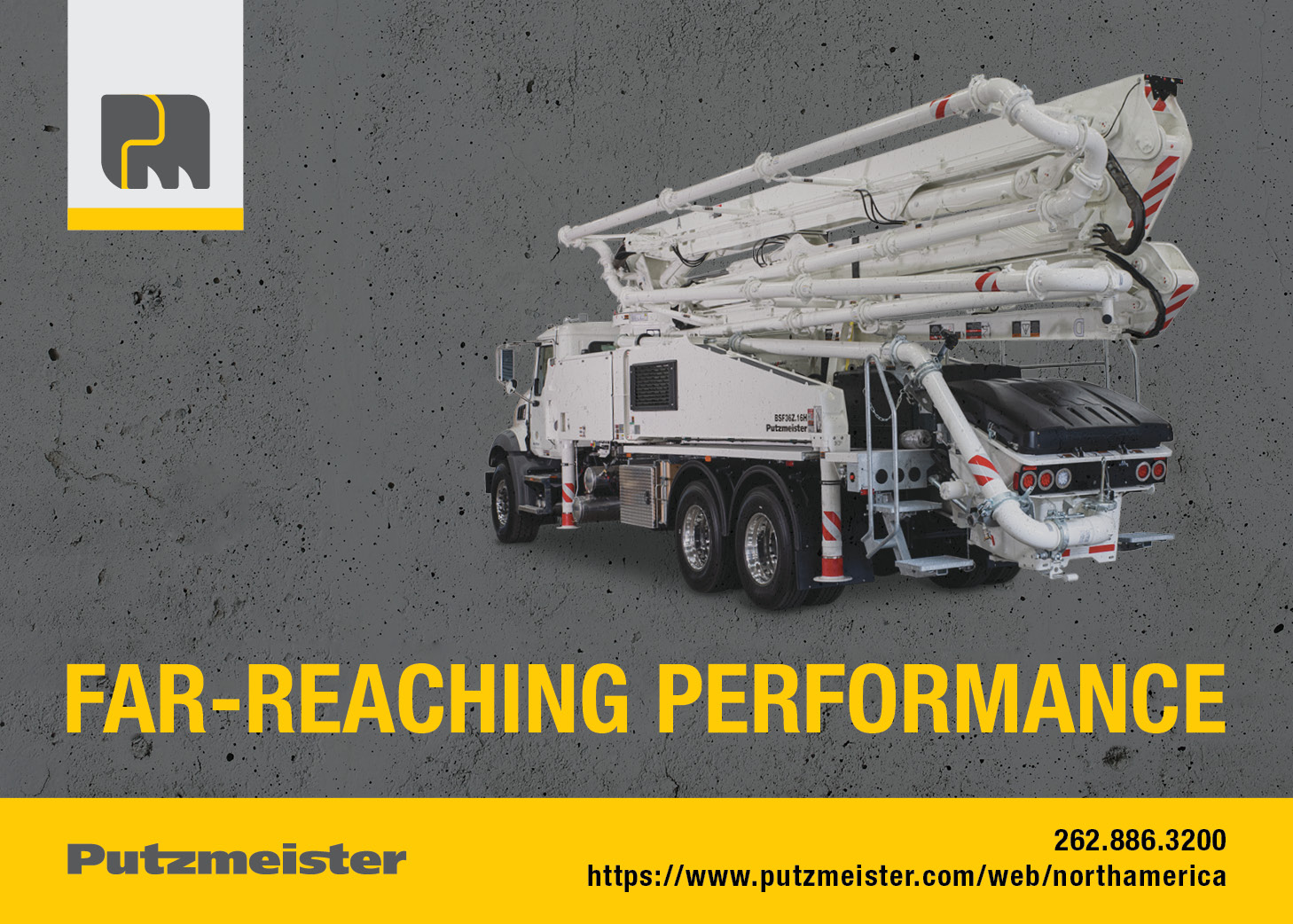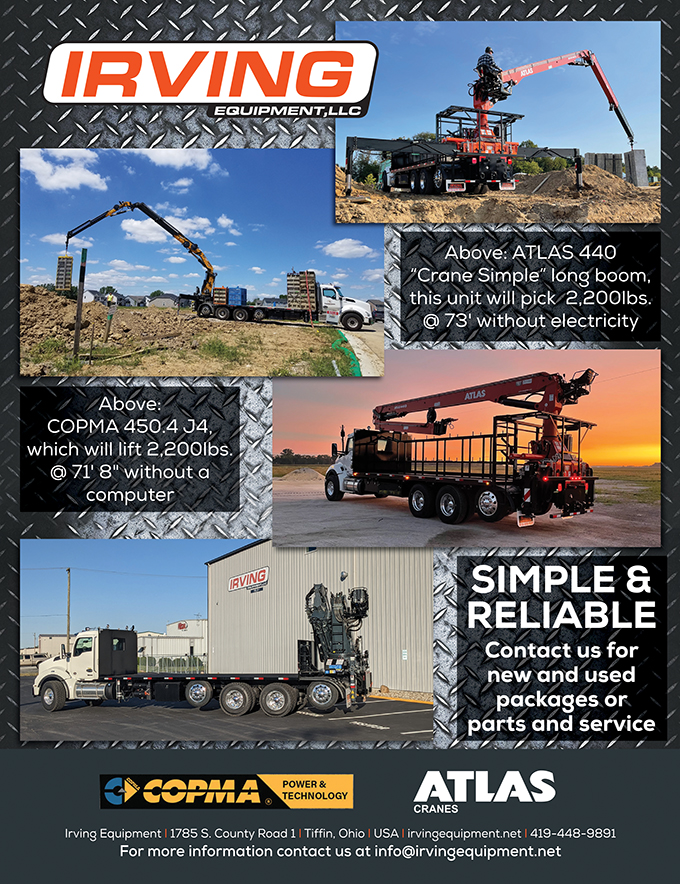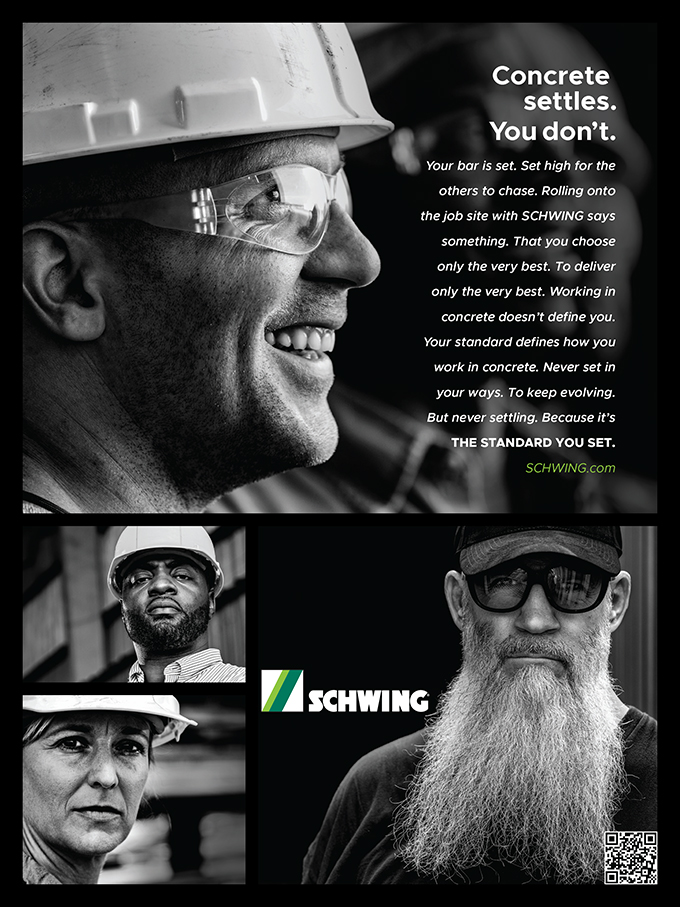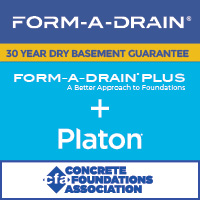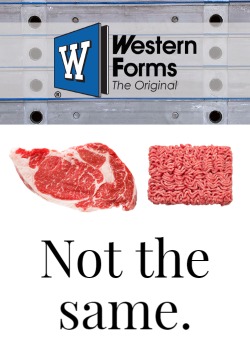INTERVIEWS WITH CFA MEMBERS WOMEN IN CONCRETE
Hot on the heals of a sold out, first-ever, ‘Women In Concrete Forum’ at the World of Concrete, we’re featuring some of the women in the foundation industry.
We’ve selected eight CFA members that have solid industry experience and make a difference to the corporations they either own or work for. Once thing is for sure — they have all paid their dues through education and by working their way up in the industry. CFA member Joan Ausbury, Cranes & Equipment Corp., says “females in a male dominated industry have to work harder to prove themselves, but the rewards are great. I never thought I’d be where I am today 25 years ago.” All together we can count over 115 years of experience with these 8 women whose stories are accounted for on the following pages.
Like the speakers at the Forum they echo words like education, experience, challenges, networking, and rewards. One of our featured members, Valerie Gore from Solid Foundations, urges women to “Learn as much as you can so you know what you are doing and what you are talking about. It helps you earn respect, something you need in an industry that is dominated by males.”
When asked to describe the CFA and the industry it represents, Jim Baty, CFA Technical Director stated: “Historically, the concrete industry has been male-dominated of somewhere around 98%. Although largely in more clerical positions, we now know how significantly that trend has been changing for women over the past two decades. The CFA is a great example of that paradigm switch as women hold many key technical, management, ownership, supervisory and primary workforce positions.”
THE NUMBERS — WOMEN IN CONCRETE
“While the trend may be on the increase in other construction businesses, no where is it as prevalent as it is in the residential foundation contractor business,” says CFA Executive Director Ed Sauter (see Executive Director’s Message, page 5).
Industry-wide, according to the U.S. Department of Labor, the entire construction industry employs about 5.4 percent of all workers and accounts for 9.8 percent of all business establishments in the U.S., with women holding just 2% of construction jobs. Current employment statistics show total annual average construction employment rising from 5,536,000 in 1996 to an all-time high of 7,277,00 in 2005, surpassing the previous high achieved in 2004.
Specific to the concrete foundation industry, the U.S. Department of Labor shows just over 230,000 workers in all occupations for the Poured Concrete Foundation and Structure Contractors industry in May 2005 — at 2%, that’s 4,600 women.
Future opportunities for women abound as the U.S. Department of Labor at the end of 2005 predicted that total job opportunities are expected to be excellent in the construction industry, especially for skilled trades workers, due to the large number of retirements of these workers anticipated over the next decade, as well as fewer people with the right education or experience entering the skilled trades.
The number of wage and salary jobs in the construction industry is expected to grow about 11 percent through the year 2014.
Employment growth will differ among various occupations in the construction industry. Employment of construction managers is expected to grow as a result of the increasing complexity of construction work that needs to be managed, including the need to deal with the proliferation of laws dealing with building construction, worker safety, and environmental issues.
Also, the growth of self employment in this industry is leading to a larger number of managers that own small construction businesses.
An especially favorable job outlook is expected for those who have a bachelor’s degree in construction science, with an emphasis on construction management, and who have related work experience in construction management services firms.
Employment growth of administrative support occupations will be limited by increased office automation.
WHAT OTHERS SAY
Dr. Heather Brown, an assistant professor in Concrete Industry Management at Middle Tennessee State University, when chosen by Concrete Network as their January 2005 Industry Leader, said she would like to see a lot more of women in the industry. “I’m one of the few. Out of our 300 students (at MTSU), 15 are women.” Although she realizes the concrete industry is far from gender blind, Brown says the easiest way to fit in is to ‘Find your niche.”
Deborah Henry, director of Special Programs at the University of Missouri-St. Louis, and a presenter at the ‘Women In Concrete Forum’, said during her presentation that although the construction industry is very slowly opening up to women, the good news is that “women own about 8% of the nation’s 2.67 million construction companies, and according to a study by the Center for Women’s Business Research, the number of women who own construction companies grew 30% from 1998 to 2004.”
Her advice was to take specific steps:
• continue your education
• develop a support system made up of friends, family, and other professional women and men
• join and be a leader in professional organizations and associations that are associated with your career.
Susan Eisenberg is the author of We’ll Call You If We Need You: Experiences of Women Working Construction and of Pioneering: Poems from the Construction Site. Susan is a union electrician who lectures nationally and she teaches at the University of Massachusetts in Boston. In an Engineering News Record article she said “From my interviews, it became clear that women enter the trades for many of the same reasons as men. They not only like the money. Women as well as men enjoy doing work that’s useful, physically active, mentally challenging and results oriented’ jobs that let you improve your surroundings.”
There is also a growing
need for women to enter the
construction fi elds internationally.
Jean Lambert, a Green Party
Member of the European
Parliament, said in 2004 that
“women need to enter the building
trade in the thousands every year
to solve a growing skills crisis in
the UK’s construction industry….
The industry itself reckons 83,000
new employees will be needed
annually until at least 2007 (in
the UK) just for capacity to stand
still.”
“The reality is far more
builders will be required, with very
specialist skills, to meet the needs
of the ‘green’ construction sector.
New building regulations and
awareness on energy effi ciency, for
example, mean we’ll need a whole
new generation of construction
workers – with a 21st Century
skills portfolio.
“This won’t happen by itself: the EU needs a strategy for training and employment in construction. We are told we are building a New Europe – I want women to be fully involved in both the physical and political dimensions.”
THE WOMEN BEHIND THE NUMBERS
Let’s come back and revisit ‘Women In Concrete’ ten years from now and see the changes that have taken place.
In the meantime, enjoy these interviews of eight women behind the statistics.
Amber Lange
708 Commerce Dr., Piqua, Ohio 45346 office 937-773-3963 fax 937-773-4904 amber@lavyconcrete.com www.lavyconcrete.comWhat is your role in your company? My main role at Lavy Concrete is Estimator, in which I am responsible for approximately 75% of the bids that our company issues. We do quite a mix of work such as Commercial Foundations, Industrial Machine Bases, Residential Foundations and Interior & Exterior flatwork. In addition to estimating I am fairly fluent in Microsoft Access and Excel which I use to create and analyze many reports for our company.
How long have you been in the foundation industry? How did you get started in the industry? I started at LCC many years ago, like when I was 10 years old I think. I can remember reading the “transit” for my dad at a basement or two. Then I graduated to cleaning toilets and the rest of the office. So after high school, a few years of college, working in a grocery deli, then becoming an insurance claims adjuster, the position of receptionist finally came available at LCC. I started out answering the phones and processing Accounts Payable then moved on to Accounts Receivable and Job Costing and now after 10+ official years of employment here, I am the Estimator.
Is there a growing number of women in your company? We have had women working in the field off and on. Currently we do not have any women in the field, but the office consists of 4 of us, our accountant Diana, our Office Manager (my mom) Jane, and Robin who takes care of Job Costing, A/R, personal secretary to the guys in the field and is learning how to estimate as well.
Does your company do anything to attract women to construction and your firm as a career choice?This past year we “earned” a project that I really feel, if I wasn’t bidding it, we may not have gotten it. It is a new foundation for the Buckeye Trails Girl Scout Program Center. I was a Girl Scout as well as my daughters and I told the GC and the Architect that fact. I went about the very complicated bid with enthusiasm because the project hit close to home. While the foundation was under way, I did a presentation to approximately 65 Girl Scouts and their leaders. I told them what was going on with the project and what my role was in the company. They were able to stick their hands in concrete and watch our concrete pump and our wall crew in action. I told them that a girl could do any of these tasks and I asked them which they would like to do. I think we may have a few more women concrete pump operators in the near future! I know our reputation as a Quality Wall Contractor had a lot to do with us earning this project, but I think that having a “Girl Scout” bidding on it gave us the edge.
Have we come a long way? Is the residential foundation industry a good place for a woman to have a career? We have definitely come a long way. I have made several friends with a newly formed, Ohio Ready-Mixed Concrete Association sponsored, women in concrete group. We are called L.E.A.R.N. or Ladies Educational and Readymix Network. Our group consists of women owning and working for ready mix companies, chemical
Any advice for woman starting out in the industry? Listen to the men, but make sure you don’t conform to their opinion or their way of doing things, unless it is the right way. Learn how to communicate. Most men don’t want it “sugar-coated”, they just want the facts. Don’t be afraid to ask for help, but make sure you really need it and that the answer is not there in front of you.
What did you want to be when you were a kid? I always thought if I was going to have a permanent role here, it would be in estimating but, honestly, I wanted to be a fashion merchandiser! So to encourage my feminine side, I am a mother, a Mary Kay Skin Care Consultant, and a Rabbit 4-H club advisor. I love working with numbers and was good in math, I just didn’t realize how much I was going to use it! I really enjoy knowing what new facility is going in across town and checking out all the house designs!
Have you ever encountered issues as a female in the industry?When I started estimating, I would get phone calls from customers who didn’t want to accept a woman in my position. After introducing my self to them as the Estimator, they would continually ask “Well does he know how much it would cost to….?” After a few aggravated moments and a few years of patience and telling them “I am Terry’s daughter, I can help you with that”, I no longer get the puzzled looks or the silence on the phone.
Joan Ausbury
Cranes & Equipment Corp 512 W John H Gwynn Jr Ave Peoria, IL 61605-2344 Offi ce 309-674-7400 jea@cranesequip.com www.cranesequip.comWhat is your role in your company? As co-founder of the Cranes and Equipment in 1982, I am currently President in charge of sales and administrative functions (however, I also do windows and water the trees and trim the shrubs when necessary!). When we first started the business,I was the only sales person,bookkeeper, parts/warehouse department and even mechanic as I assisted in the installation and rebuilding of cranes. Having started the business in the basement of my house with a$500 investment – that’s right, five hundred dollars, we are now in a new 30,000 sq. ft. building sitting on five acres with 24employees. I can honestly tell my employees I don’t ask them to do anything I haven’t already done – except weld, and I’m too old to learn now.
How long have you been in the foundation industry? How did you get started in the industry? How did I get started in the crane business? Having previously worked as Assistant Sales Manager for the hometown Caterpillar dealer, I was constantly reminded by some peers that “if you can do it for them, you can do it for yourself.” Although cranes were not in the yellow product line at that time, it was something new to me and seemed to be a challenge. And so after 13 years dealing with tractors, loaders, motor graders, excavators and engines, I jumped into the sink-or-swim pool of self employment. That was 24 years ago. Although I sometimes take more steps back than forward on any given day, I’m far ahead of where I started. Those backward steps only make us stronger.
Is there a growing number of women in your company? My Parts Manager is a female and has been with us for ten years plus four additional females in various roles of accounting and secretarial functions.
There are very few females in the crane industry as it’s not a field many females inspire to pursue. I’m sometimes referred to as “The Crane Lady”.
Have we come a long way? Is the (CRANE) industry a good place for a woman to have a career? It would be no different than a female MBA graduate deciding to go into pharmaceutical sales or aggregate sales or concrete form sales. One can learn by textbook the concept of selling, but must learn about the product being sold before he/she can become proficient at it. Knowing the product is first and foremost, knowing the application you are selling into is probably as equally important. That’s what selling is, talking about your product and how it fits into your customers application. It doesn’t matter if the salesperson is male or female.
Have we (residential foundation industry) come a long way? Definitely. Back in the early 80’s foundation contractors were satisfied just to get their forms on/off their truck with a crane that had 35 feet of reach. Twenty plus years later these same contractors are looking for reaches pushing 100 feet. Residential job sites have changed (more secluded and/or wooded areas), the size and complexity of foundations have changed (no longer rectangular foundations); the workforce and employment conditions have changed forcing contractors to make handling concrete forms easier. The foundation contractor knows concrete and forming; it’s my responsibility to make him aware of not only what my product can do for him, it’s benefits and features, but also such things as:
• Proper sizing of the chassis
• Legal weight limits as they apply to him in the state(s) in which he operates
• Proper placement of loads on the truck in order to comply with the weight laws
• Current Federal, State and/or local standards and/or certifications
Any advice for women starting out– their own business — crane or otherwise? Perseverance and confidence. The “I think I can, I think I can” attitude must change to “I know I can, I know I can” and then do it. It doesn’t matter if it’s in the foundation industry or the crane industry. Know your business well and treat people fairly.
What did you want to be when you were a kid? TEACHER; typing, shorthand (ha ha) and office procedures. I’d probably have been unemployed long ago had I actually pursued that career with the onset of computers and other electronic devices that make dictation and shorthand a thing of the past.
Have you ever encountered issues as a female in the industry? Of course. There is and always will be a select few who view women in a male dominated industry as inferior. What’s reassuring is when you hear back from some of those people with comments like, “she really did know what she was talking about” or “I got more information from her than I did from any of her male counterparts or competitors.”
Having come from a male dominated industry early on (earthmoving equipment), I learned then how to handle the comments, remarks and attitudes. Females in a male dominated industry have to work harder to prove themselves, but the rewards are great. I never thought I’d be where I am today 25 years ago. Being a single mother, there were times I didn’t think I’d have the money to buy bread and milk for my daughter and I. It only made me work harder. I KNOW I CAN. I KNOW I CAN.
Lisa Crawford
Western Forms Inc 6200 Equitable Rd Kansas City, MO 64120 Office 800-821-3870 lcrawford@westernforms.com www.westernforms.comWhat is your role in your company? Director of Marketing: I am charged with a variety of marketing, public relations, and advertising decisions, as well as their execution. I work with other departments to launch products, build our overall brand, and strengthen customer and distributor relationships. I manage a department that includes creative, strategic, and tactical personnel. Together, we accomplish everything from media buys to online presence, day-today communications to trade shows and special events, database maintenance to strategic planning.
How long have you been in the foundation industry? How did you get started in the industry? 3 Years. I got started when the opportunity to change industries and grow in a new direction was presented to me after my predecessor left the company.
Is there a growing number of women in your company? It’s pretty much staying the same. Much of the office staff is female, covering many roles, including management. We also have a female presence in our manufacturing facility. However, there are no women involved in sales or product management.
Does your company do anything to attract women to construction and your firm as a career choice? Not that I know of.
Have we come a long way? Is the residential foundation industry a good place for a woman to have a career? Gender can work either way. On the plus side, I think it helps those of us in management (especially a customer-facing position such as mine) to stand out a bit more and have our message get noticed, even if it’s only due to the curiosity factor. I think women in positions such as receptionist, customer service, or department support are not seen as novel; almost expected. However, it is rare to encounter someone that holds a decision-making position in sales, upper-management, or fieldwork. These areas still have a lot of “good ‘ol boy network” politics associated with them and it will be hard to crack that and be taken seriously or not resented.
Any advice for women starting out in the industry? As with all industries, be good at what you do and earn the respect of your peers, coworkers, and customers based on who you are, not what you are. Talk to other women in the organization you are considering about how they feel women are treated and represented, but also try to see the overall impression the company and industry makes in treating people and individuals, regardless of gender. Make your own decisions based on your instinct and past experiences, and don’t put too much focus on being a woman over being a person. Join the industry because you have a passion, whether that passion is residential concrete, trying a new challenge, or knowing you can make the position and the company the best it can be.
What did you want to be when you were a kid? Space princess. Elephant in-vitro specialist. Professional mini-golfer.
Have you ever encountered issues as a female in the industry? I’ve encountered issues being me, but I don’t know if that’s because I’m a woman or because I’m who I am! Of course, in a male dominated industry, with jobs marked by a physical expectation and reputation (foundation crew responsibilities and manual labor) and past ownership composition (father-son companies) there are some things that will be a challenge, but it’s up to you to pick the right company to be treated fairly when it could easily go the other way. And, at least I never have to share a room when we go to trade shows.
Valerie Gore
Solid Foundations, Inc. 2000 County Road 292 Bellevue, OH 44811 Office 419.483.8805 FAX 419.483.8814 gore@sfoundations.com www.sfoundations.comWhat is your role in your company? I would have to say administration is my main role. I am responsible to oversee and implement most systems in the company. I am in charge of safety, accounting, customer relations, and any other functions that go through the office.
I am a support person to many people in my company. I do a lot of daily “trouble-shooting” and problem solving, which is what I enjoy the most.
How long have you been in the foundation industry? How did you get started in the industry? My husband and I started Solid Foundations, Inc. in 1990, so it will be 16 years this fall.
Is there a growing number of women in your company? Not really. I have two women in the office (plus myself ), and about 17 men in the field.
Does your company do anything to attract women to construction and your firm as a career choice? No, not really.
Have we come a long way? Is the residential foundation industry a good place for a woman to have a career? We have hired women in the office. I would not be opposed to hiring a woman in the field.
I think women are great detail people. They are good organizers and with the right women have great people skills. I am fortunate to work with two other women that are easy to work with and are really good at their jobs. They really care about the outcome of their work.
Any advice for women starting out in the industry? Learn as much as you can so you know what you are doing and what you are talking about. It helps you earn respect, something you need in an industry that is dominated by males.
What did you want to be when you were a kid? I have always wanted to own a business.
Have you ever encountered issues as a female in the industry? I would say that most of my experiences have been good and productive. I spend a lot of time learning about this industry so I can be on looked upon as resourceful. That is the best way to earn respect in any job or industry, but especially when you work with men. It also helps you get work!
There have been times that I feel I am in over my head. I pray and God has always faithfully given me the wisdom I need to figure things out and do things best!
Over the years I have learned your employees are your company. You have to lead them and help them understand how you want things done and in what time frame. You can never over educate or over train them. It takes everyone to accomplish what we do every day, consistently, and when we say we will.
My husband, Daniel Gore, is an excellent production manager. He works directly with the crews helping them understand their daily objectives and equipping them with what they need to accomplish their work. Working with my husband has been a trying but overall good experience. I would have it no other way!
We have always put priority on new Technology and having equipment that makes our employee’s jobs easier. Sometimes I go out to the field (especially flatwork) and have the men explain what they are doing and how the equipment works. We have field leaders that have been with us a long time that really know what they are doing so I learn from them.
I think overall, working as a woman in this industry has been a great experience. The men I deal with are all so unique. You just have to try to understand them and how they think and operate in order to help them accomplish their objectives.
Mary Carr
Oak Ridge Solutions 17251 Foundation Parkway Westfield, Indiana 46074 Office 317-896-2885 maryc@customconcrete.com www.oakridgesolutions.com www.customconcrete.comWhat is your role in your company? I am the Internal Operations Director for Custom Concrete and President of Oak Ridge Solutions. I work with the Custom Tracker program in development, implementation, and application of the software. My husband is Tom Carr. We are part of the ownership for both companies.
How long have you been in the foundation industry? How did you get started in the industry? I was married to Tom Carr in 1982, and I began working in his family’s small business office, Custom Concrete, in the fall of 1984. The business was beginning to grow and it was necessary to have added office help. Until that time, Betty Carr, my mother-in-law, was the only office staff. She handled all the accounting and administrative functions of the business out of her home and she did it extremely well. Joe Carr laughs about the concern at that time that there would be enough work to justify my full-time employment. Since that time, I have been a part of several changes and have watched the growth of the office staff and internal processes at Custom.
Is there a growing number of women in your company? Yes, we currently have 20-25 women employed at Custom Concrete. Their job descriptions are varied and include titles such as Assistant Controller, Sales Account Coordinators, Human Resources, Production Management, CAD design, Yard Security, and Accounting.
Does your company do anything to attract women to construction and your firm as a career choice? Although we do not search for candidates based upon gender, we will readily interview women for almost any position and encourage them to apply.
Have we come a long way? Is the residential foundation industry a good place for a woman to have a career? The construction industry including the residential foundation industry has been somewhat reluctant to welcome women. We have come a long way with being receptive to women in professional office roles within the foundation industry, but there are still areas unchallenged by women. Perhaps the next ten years will do more to create a greater opportunity in those areas.
Any advice for women starting out in the industry? In every industry, my advice for women is to try to be patient, helpful, kind, and wise. Every business will face problems and women can offer solutions. Although the suggestions may not always be welcome, patience and consistency are the keys. Above all, the Lord should receive the credit for everything we do whether we are a man or a woman.
What did you want to be when you were a kid? I always wanted to teach high school history, business classes, and/or English.
Have you ever encountered issues as a female in the industry? Yes. Where there are people, there are problems. They may be described as “female” issues, but they are actually people problems. I have heard it said that, “At the heart of every problem is a problem of the heart.” Amanda
Herbert Morris
Herbert Construction Company P.O. Box 996, Marietta, GA 30061 Office 770-795-0103 Fax 770-795-0734 amandam@herbertconstruction.com www.herbertconstruction.comWhat is your role in your company? Vice President of Operations. I oversee the scheduling of the jobs, crews, layout and drawings.
I also meet with other officers of the company to determine the company’s direction.
How long have you been in the foundation industry? How did you get started in the industry? I have essentially been in the foundation industry most of my life. My parents started Herbert Construction Co. when I was 4 years old and I grew up in the business.
I worked in many different areas in the company throughout summers during high school. I attended Lawrence Technological University and earned a BS in Architecture. While attending college I worked for a different foundation contractor, along with a development company and an architecture fi rm. All of these experiences gave me a new insight into the construction industry and specifically concrete foundations.
Since attending college, I have been working for Herbert Construction Co. for eight years.
Is there a growing number of women in your company? There is a steady number at this time.
Does your company do anything to attract women to construction and your firm as a career choice? My mother, Linda Herbert, is an owner of the company. Her presence throughout the years has created an inspiring example of a woman in construction. In the past, Linda has been an active member in NAWIC (National Association of Women in Construction).
Have we come a long way? Is the residential foundation industry a good place for a woman to have a career? I believe we have. Men are more accepting of working with a woman; in most cases, I do not think there is a second thought given to the fact that she is a woman.
Any advice for women starting out in the industry? Do not be afraid to be a woman. When I started out dealing with men in this industry, I thought that I had to be as tough as the men were. However, men are expected to be gruff, and if a man speaks to another man in a harsh tone, it is expected and accepted. For women dealing with men in the construction industry it is a different expectation and I have found that the old adage holds true “you can catch more flies with honey than with vinegar”. It is much easier to get what I want when I ask nicely and do not demand.
What did you want to be when you were a kid? An Architect. I always said I did not want to be a concrete contractor because I did not want to work all the long hours.
Have you ever encountered issues as a female in the industry? Not that I am aware of. I grew up around men in construction, and then I went to a university to study a field dominated by men. I am used to working around men and if I have encountered issues as a female in the industry, I did not notice.
Editor’s Note: Amanda is also a CFA Board Member. Amanda and other Board members work together with the CFA staff to carry out a multitude of educational and promotional efforts for the advancement of concrete foundation technology.
Jane Lavy
Lavy Concrete Construction, Inc. 708 Commerce Dr., Piqua, Ohio 45346 office 937-773-3963 fax 937-773-4904 jane@lavyconcrete.com www.lavyconcrete.comWhat is your role in your company? At this time I am Office Manager, front door receptionist, process Payroll and handle employee benefits. I am also handling uniforms, working with vending machines and do all sorts of secretarial things. I am also part owner and wife of the president, Terry. So we have work conversations at home all the time.
How long have you been in the foundation industry? How did you get started in the industry? When I married Terry in 1972, he was working for his uncle DJ Lavy, and was learning how to pour concrete. Terry started managing the company and was in need of help in the office so I started to work for this company in 1985. At that time it was D.J. Lavy Concrete Construction. A few years later we purchased the company from Terry’s cousin and changed the name to Lavy Concrete Construction. I told Terry I would come to work if I could come home at noon so I could keep up with the house and kids. That was when we did everything manually. That didn’t last long. Terry and I did everything in the office, from estimating, to billing and collecting. At that time we only had 8-10 employees. Terry also worked some in the field and worked on the company’s equipment in our garage at home so I was exposed to the company at home too. I also have spent many evenings when I thought we were going out to eat and have a nice night out, and end up running by a job site to see how it was going. We have spent a lot of time looking at anything in concrete.
Is there a growing number of women in your company? We have had a few women out in the field but most of the women are in the office. Our daughter, Amber started out as a child cleaning the office. After working at another job for a little while she then come back to help out with the bookkeeping. She now is our full time Job Estimator. Being an estimator for a construction company is typically a man’s job, so she has had some hurdles to jump over. She has always been a numbers person and does a real good job at putting the numbers together. She has been exposed to the jobs we were working on since she was a child and understood how it went together. She has even been known to go out and prep slabs to get ready to pour.
Does your company do anything to attract women to construction and your firm as a career choice?
We recently did the concrete work for a new Girl Scout facility and have had groups of Girl Scouts in to show them how the foundation was put in. Amber was one that gave the talk and asked the girls if any of them would like to work in the concrete construction business. Many of them were interested, especially driving the big equipment. Of course Amber’s two girls were involved and have been exposed to the concrete industry just as Amber was. Who knows, there may be another generation in the training.
Have we come a long way? Is the residential foundation industry a good place for a woman to have a career? Yes, women have finally been accepted in a man’s world. They usually have to prove themselves, it’s not just given to them.
Any advice for women starting out in the industry? Perseverance, and common sense. There’s lots of places to show an artistic side, as in the colored and stamped concrete
What did you want to be when you were a kid? I have always wanted to be outside and never afraid to get dirty. I never thought I would be so involved in the concrete industry since I was raised on a farm. I thought I would be doing something that had to do with the outdoors.
Have you ever encountered issues as a female in the industry? I wish sometime I was considered more as an individual and not the boss’ wife. I guess that is what you get when you work your whole adult life with your husband, the boss.
Kay Lanahan
Advanced Concrete Foundations 3798 Three Notch Rd Louisa, VA 23093 Office 434-589-1122 KLanahan@acfoundation.net www.acfoundation.netWhat is your role in your company? General Manager. Originally my husband Tom and I tried to find someone for this job when we learned he had rhumetoid arthritis, but we just couldn’t find the right person. So for awhile I did two jobs at once, then made the decision to work full time for ACF. I initially came to handle the accounting, then stepped into the GM position 3 years later. I came from the construction world, but had to learn a lot by the seat of my pants. Our son Josh is in sales for our company and both my husband and son taught me a lot.
Tom continues to work with various customers and is of course the expert here with technical issues.
I feel very lucky that both my son and our daughter are also involved in the business. Ashley handles operations, and Josh has learned this business inside out and backwards.
Advanced Concrete Foundations is a smaller business with about 100 employees. We were strictly footings and walls, but have expanded to offer our builders a total package by adding slab-footwork and waterproofing.
We focus primarily on custom work and are adding commercial — up to 30%. I do the estimating for commercial work. Our residential tends to be very complicated, and I’ve found the commercial work is usually much simpler wall structure.
How long have you been in the foundation industry? How did you get started in the industry? Here 6 years, then in construction 10 years.
Is there a growing number of women in your company? Yes. We have two women that run operations. Our controller is a woman, and we have a woman who handles payroll.
Have we come a long way? Is the residential foundation industry a good place for a woman to have a career? Yes — very definitely. Construction is such a detailed-oriented business and women are traditionally detailed-oriented. I think women naturally bring that talent, along with the ability to multi-task, to the construction industry. It is an absolute requirement to multi-task in this industry.
When hiring for our company, I tend to listen and have learned to take a step back in hiring. By this I mean that I feel that applicants often have not been given a fair shake in life. I approach the employer-employee relationship by explaining that we work under a team concept. I stress to our people that if they are fair with us, we will be fair to them. As a result we have really great employees. Women can be a little softer, so this is something I feel I can bring to this business.
Any advice for women starting out in the industry? A cool head and lots of knowledge (the technical stuff that CFA supplies) makes the job fun.
When hiring (for women or men) we don’t require higher education, but instead I look for the I-can-do attitude and willingness to learn. Technical ability is helpful, but we try to get people to as many seminars as possible, like the CFA seminars. These are invaluable and I find our people drink in the information. I tell them ‘learn one thing from the seminar and its worth your time’.
What did you want to be when you were a kid? A ski bum.
Have you ever encountered issues as a female in the industry? No. It is not a problem for me to deal with any companies on any level now. I don’t find any resistance to women. When I first went to (industry) meetings, there were no women. At our local association meetings there is almost 50% women in attendance, most of them sub contractors or from small businesses.
*****
SOURCES
1 – www.concretenetwork.com 2 – ‘The Concrete Producer’, April 2006, Kari Moosmann 3 – Engineering News Record, The McGraw-Hill Companies, October 15, 2001 4 – www.greenparty.org/uk